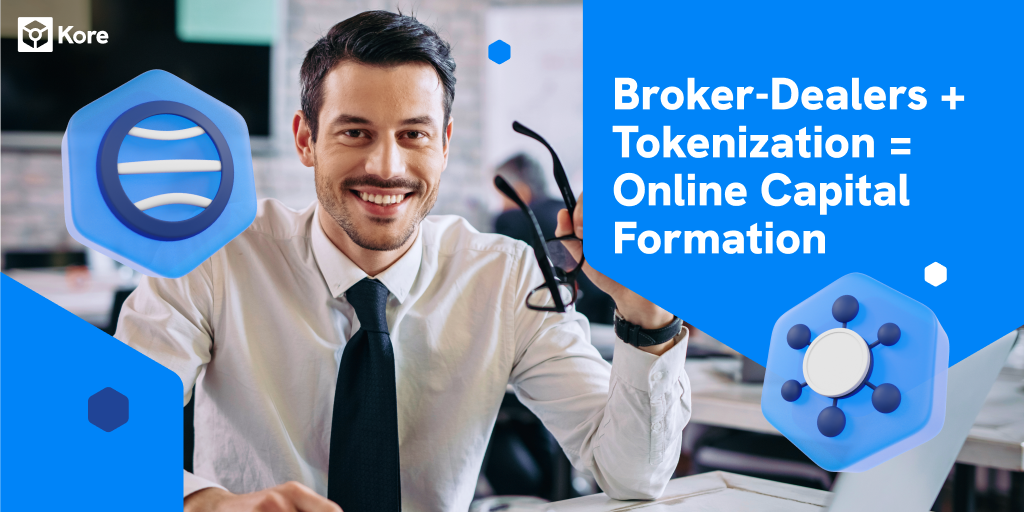Broker-Dealers + Tokenization = Online Capital Formation

Have you ever wondered how tokenization is transforming the role of broker-dealers in private markets?
When we talk about tokenization in the context of private markets, we’re specifically referring to tokenized securities. These are digital representations of ownership in assets like equity, debt, or other financial instruments, governed by securities regulations. Tokenized securities are issued and managed on blockchain platforms, providing new avenues for broker-dealers to streamline processes and expand market access.
The fusion of tokenized securities and online capital formation is revolutionizing how broker-dealers facilitate capital raises. By digitizing assets and ensuring compliance, tokenization creates new opportunities for efficiency, transparency, and liquidity in private markets.
This article explores how broker-dealers are leveraging tokenization to enhance online capital formation and position themselves as leaders in the digital securities revolution.
Understanding Tokenization: A Game-Changer for Capital Formation
At its core, tokenization refers to the process of converting real-world assets—like equity, debt, or tangible assets—into digital tokens that are issued and managed on a blockchain. These tokens represent ownership, rights, or claims to the underlying asset and can be traded seamlessly on digital platforms.
However, to truly unlock the potential of tokenized securities, it’s essential to understand how they work within the framework of U.S. regulations, particularly Regulation A+ (RegA+). Simply creating a token does not mean it can be transacted under RegA+ or any other regulation, nor does it guarantee qualification from the SEC. Different jurisdictions have distinct rules, and regulations vary widely in their requirements.
Tokens alone do not inherently have specific rights; their value and function depend on what lies behind them. This includes the smart contracts that govern their operation and the regulatory framework they adhere to. Compliance typically requires the involvement of third-party intermediaries, such as transfer agents and custodians, who play a pivotal role in managing transactions and investor protections.
A critical challenge is that many of these intermediaries may not yet be equipped to accommodate blockchain-based solutions. This gap underscores the need for robust infrastructure that bridges traditional systems with blockchain innovation—something that companies like Kore excel at by providing end-to-end solutions designed for regulatory compliance.
The Role of Broker-Dealers in the Tokenization Ecosystem
Broker-dealers are uniquely positioned to facilitate tokenization due to their expertise in compliance, due diligence, and investor protection. Their role in the tokenization process includes:
- Structuring the Offering: Broker-dealers work with issuers to design tokenized securities that meet regulatory standards and align with market demand.
- Investor Onboarding: Using advanced platforms, broker-dealers streamline KYC/AML processes to onboard investors efficiently and securely.
- Managing Compliance: From blue-sky filings to ensuring adherence to SEC rules, broker-dealers oversee every aspect of regulatory compliance.
- Facilitating Secondary Market Trading: Broker-dealers enable trading of tokenized securities on Alternative Trading Systems (ATS), creating liquidity pathways for investors.
Blockchain plays a pivotal role in this ecosystem by providing immutable audit trails and logs of the investor journey. Every interaction—from initial accreditation checks to the final transaction—is recorded on a secure, permissioned blockchain, offering transparency and traceability. This ensures broker-dealers have a comprehensive record for reporting, compliance, and auditing purposes.
Tokenization and Online Capital Formation: The Perfect Match
Online capital formation has already reshaped private markets by making it easier for issuers to connect with investors. Adding tokenized securities into the mix amplifies these benefits by introducing unparalleled flexibility and scalability.
- Broader Investor Access: Tokenized offerings allow broker-dealers to attract both retail and institutional investors through online platforms.
- Reduced Costs: Tokenization minimizes administrative overhead by automating processes like cap table management and dividend distribution.
- Improved Speed: Blockchain technology accelerates settlement times, enabling faster and more efficient transactions.
For broker-dealers, combining tokenization with online capital formation unlocks significant competitive advantages. With infrastructure providers like Kore, they can offer end-to-end solutions that simplify compliance while delivering innovative, investor-friendly experiences.
Conclusion: Tokenization is the Future of Capital Formation
As private markets continue to evolve, the integration of tokenized securities and online capital formation is becoming a necessity for broker-dealers. By adopting this technology, broker-dealers can expand their service offerings, enhance operational efficiency, and deliver greater value to issuers and investors.
With the support of technology platforms like Kore, broker-dealers are equipped to navigate the complexities of tokenized securities while ensuring SEC compliance and providing auditable records throughout the investor journey. Blockchain’s ability to log every step of the process transparently further strengthens trust and efficiency in private market transactions.
The equation is simple: Broker-Dealers + Tokenized Securities = The Future of Online Capital Formation. However, it’s critical to recognize that your tokenization technology partner must go well beyond just tech. Understanding the regulations governing the jurisdiction—end to end—is essential, or you may find yourself in a world of compliance challenges.
Tokenization involves more than creating a digital asset for primary sales. It requires a robust framework to manage holder tokens post-issuance, including updating personal information, facilitating transfers, and enabling trades. These activities often interact with intermediaries such as broker-dealers or transfer agents and must comply with regulations to ensure smooth operations and avoid downstream disruptions.
By choosing a technology partner with deep expertise in both blockchain and securities regulations, broker-dealers can ensure a seamless, compliant, and future-ready approach to capital formation.





